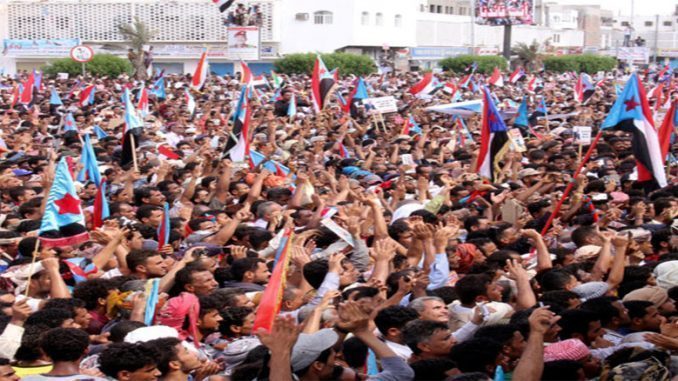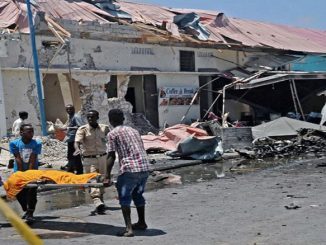
Yemen appears to be on the verge of final steps to re-partition the country to ‘north’ and ‘south’, if not more, in light of the continuing civil war and the intensified Saudi-Emirati differences and conflict for influence.
In fact, the tensions between Saudi Arabia and UAE over Yemen’s leadership spring from differences in perspective over the role of Islamists in the region, and particularly in Yemen. While the UAE is more strident in its opposition to regional Islamist actors, rejecting any role for Islamist political movements in the region, particularly the ‘Muslim Brotherhood’ in Yemen, Egypt or the UAE, or for any other radical political groups, including ‘Salafi’ parties. This is the case even where other Gulf Co-operation Council states have got a different view that is less rigid, for instance Saudi Arabia and Qatar’s support of some Islamist groups in Syria.
UAE pursuing influence in Yemen
Since the UAE soldiers stepped onto the land of Yemen, the Arab Gulf country did not stop all the time trying to establish its influence in a country which has been suffering from a fierce war for nearly two years.
The United Arab Emirates has used numerous ways to establish its influence in Yemen:
First, this was through supporting specific groups such as the’ Southern Movement’ in southern provinces, which seek to restore the memory of the past (Separatists who have always sought the secession of ‘South Yemen’).
Second, the UAE intensified its military presence in Yemen, either through soldiers or through munition and weapons it used to supply to the fighters on the ground.
Humanitarian aid was the third way the UAE used to extend its influence in Yemen, especially in the southern regions that have been liberated from the control of the Houthi militias and the forces of former President Ali Abdullah Saleh.
Perhaps the latest way to extend its influence in Yemen, the UAE sought to control some Yemeni islands, which was rejected by the Yemeni president.
UAE’s relations with former president’s son
The UAE is host to Mr Saleh’s son, Ahmed, who has served as Yemeni ambassador to the UAE. When the Emiratis were attempting to broker a peace deal to end the Yemeni conflict, they used the younger Mr Saleh as a go-between with his father. The UAE has not welcomed news that the Saudis are now focused on reaching agreement with their apparent enemies, the Houthis, at the expense of the former president.
Pro-Saudi Hadi’s decisions anger UAE
1- Hadi’s changes in February, 2016:
Yemeni President Abd Rabbuh Mansur Hadi made in February last year changes in the internationally recognised leadership of Yemen that underscored UAE differences with Saudi Arabia about the future direction of the country, where both Saudi Arabia and the UAE are militarily involved in supporting Hadi’s government against Iran-backed Houthi rebels. Yemeni President Abd Rabbuh Mansur Hadi then issued a set of presidential decrees, sacking his deputy, Prime Minister Khaled Bahah, and appointing General Ali Mohsen al-Ahmar and Ahmed Obeid bin Dagher, as Vice President and Prime Minister respectively.
In fact, the Saudis were instrumental in the decision of the Yemeni president to sack the prime minister, Khaled Bahah, and appoint Ahmed al‑Daghar in his place as well as elevating Ali Mohsen al‑Ahmar, who is known to have strong Islamist leanings, to vice-president. Ali Mohsen is close to both the Saudis and the Yemeni Muslim Brotherhood, whose tribal followers fight with him, and is an enemy of the former Yemeni president, Ali Abdullah Saleh, whom he turned against in 2011 when he was head of the 1st Armoured Division.
As a result, the UAE did not welcome these changes in Yemen, and the Emirati troops fighting in Yemen kept away from Saudi action co-ordinated with Ali Mohsen or the Muslim Brotherhood.
2- Hadi’s recent changes in Aden:
The recent decisions and appointments issued by Hadi have poured oil on the fire, regarding the UAE-Saudi competitiveness in Yemen. Yemeni President Abd Rabbuh Mansur Hadi dismissed Aden Governor Aidarous al-Zoubeidi and State Minister Hani bin Breik last April 27 over their close ties with the United Arab Emirates (UAE). In an interview with Middle East Eye earlier this week, Hadi accused the UAE of acting “like an occupation power in Yemen rather than a force of liberation.”
Dispute between Hadi and Emirati officials on: ‘Who controls Aden Airport?’
The dispute between the Yemeni President ‘Hadi’ and UAE officials appears to have started over argument about who controls Aden airport. The feud between the two men threatens to split the alliance between forces who are fighting the Iranian-backed Houthis. Sources close to Hadi told MEE that an angry confrontation took place between the two leaders when Hadi flew to Abu Dhabi in an attempt to patch up differences over who controls Aden’s airport, a key supply route for Emirati-backed troops and the Yemeni president himself.
The meeting in late February lasted 10 minutes, took place in a side room in the palace – not the official meeting place for visitors – and ended in a burst of anger and mutual recrimination, sources said. When Bin Zayed reminded Hadi of how much the UAE had sacrificed in the fight to liberate Yemen, Hadi responded by saying the Emiratis were behaving “like an occupation power in Yemen rather than a force of liberation”. This enraged Bin Zayed even more, the sources said.
The feud between the two men has stymied at least two attempts by the Saudis at mediation and now Hadi has sacked two men close to the Emiratis. They are Aden’s governor Aydarus al-Zubaydi, and Hani Ali bin Braik, a minister of state and general commander of the forces of the Security Belt, run by the UAE.
However, the crisis between Hadi and the UAE deepened when the latter demanded to have an influence on some Yemeni islands which Hadi refused considering it a violation of Yemen’s sovereignty. The Yemeni President then returned to the Saudi capital Riyadh to discuss the recent developments of the security situation in Aden, in light of his attempt to impose the state authority over the city considering it temporarily as the capital of the country, which is opposed by some security leaders that are funded by the UAE.
Yemeni politicians say the UAE’s low and inappropriate formalities with Hadi were prominent during his welcoming ceremony at the airport and the Emirati officials’ repeated excuses for turning down meetings with him, which shows increasing tensions and rifts between Abu Dhabi and Riyadh.
Aden Airport issue
The Aden airport issue first erupted when Hadi himself was refused landing permission in early February and had to land instead on the Yemeni island of Socotra before he made another attempt to fly back into Aden.
Hadi responded by firing the head of the airport who had refused to obey orders.
Hadi then had Brigadier General Muhran Qabati, commander of the Fourth Brigade – which acts as the presidential bodyguard – lay siege to the airport, and clashes between the two sides followed.
The Saudis attempted to mediate by arranging a meeting between the Saudi defence minister, Mohammed bin Salman, Hadi and Bin Zayed in Riyadh. The meeting in Abu Dhabi between Bin Zayed and Hadi took place two weeks after that.
Hadi threatened to go ahead with the sackings, but Riyadh made a second attempt to intervene.
A second incident has recently occurred at the airport which aggravated the situation. Qabati’s plane landed at the airport, and the Emiratis in control of the airport refused to allow him to leave.
Qabati refused to fly away from the airport in the airplane he came in on. The standoff was finally resolved when the Saudis flew a private jet to take the brigadier general back to Riyadh.
This incident was the last for straw for Hadi, who went ahead with the firing of the governor of Aden and the minister. Other sackings will follow, sources say.
The Saudis have since been forced to back Hadi publicly. Hadi’s legitimacy has been endorsed first by a meeting with the Saudi king, Salman, and then by meeting the US ambassador.
According to Arabi 21, Bin Salman is said to have declared Riyadh’s support for “all the decisions, measures and arrangements that support legitimacy and put in order the security and military situation in Aden and the rest of the provinces”.
In fact, the rifts among the Saudi-led coalition members are widening so fast and so deep that frequent reports are surfacing the media in this regard.
The UAE reacts to Hadi’s decisions
In fact, no one knows quite what Bin Zayed will do in the future. Apart from the presence of Emirati special forces in Yemen, the UAE is expanding its grip on southern Yemen by funding groups loyal to them. The UAE’s foreign minister, Anwar Gargash, has criticised the sacking of the two men described as close to the UAE. In a tweet on his personal Twitter account on Saturday, Gargash said: “Among the rules of political action is that you should build trust with your allies, that you should not stab them in the back, that your decisions should be commensurate with your capabilities and that you put public interest ahead of personal ones.”
Another sign of official Emirati anger with Hadi was apparent in a tweet by Dhahi Khalfan Tamim, Dubai’s head of security.
He said: “Replacing Hadi is a Gulf, Arab and international demand.”
He added: “The first steps toward a solution in Yemen would be to end Hadi’s reign, which has eroded with time.”
Yemen’s poverty-stricken teachers swap class for Kalashnikovs
Khalfan went on to say: “What the UAE and the resistance have achieved is being demolished by Hadi. Is this a president who deserves that we deal with?”
UAE escalates in Aden
Aden witnessed large popular protests organized by pro-UAE groups in southern Yemen on May 4, in response to Hadi’s recent decisions. The organizers of the festival, which took place in the southern city of Aden issued what they called “Aden Historical Declaration”, in which Aden’s sacked governor, Aidaros al-Zubaidi, was authorized to form a political leadership for South Yemen under his chairmanship. They also announced their rejection of the decisions made by Yemeni President Abd Rabo Mansour Hadi about a week ago.
The ‘declaration’ said the political leadership, to be formed by al-Zubaidi, will represent Yemen before the international community, stressing that partnership with the Arab Coalition will remain strong to achieve the common goals, particularly in facing the threat of Iran’s expansionist project.
“Aden Historical Declaration” was announced during demonstrations mainly called for in Aden by the Southern Mobilization, a pro-UAE separatist group, in protest against the recent decisions issued by President Hadi that sacked senior Pro-UAE Yemeni.
The two men sacked by Hadi, Aden provincial governor Aydaros al-Zubaidi and cabinet member Hani bin Brek, are both seen as supporting separatism for southern Yemen, while Hadi is determined to tighten his grip over a unified country. Moreover, diplomats and some analysts say Hadi is uncomfortable with the fact that among the forces trained and supported by the United Arab Emirates are some pro-secessionist fighters.
The declaration said the South Mobilization reiterates that the South, as a homeland and an identity, in its present and future, is by and for all its people, and that the ‘post-May 4 South’ is different from the South before that date, on the basis of consensus and southern national partnership.
The declaration added, “From here – the city of Aden – the southern popular will, which is the only real legitimacy, declares rejection of those decisions and any similar decisions in the future, and expresses its desire to exercise its legal right for protecting the issue of the South… especially with the availability of subjective and objective factors in this historic moment that must be picked up and used.”
The declaration also explained that “the great popular mobilization came to preserve the southern victory, and build the aspirations of the people on its basis.”
What is after May 4 declaration?
According to observers, it appears that the post-May 4 era will be different from the time before that date, at the level of the whole Yemen, not just the South. If the items of this declaration go into effect, Hadi’s power will be overthrown in Aden as it was overthrown more than two years ago in Sanaa, which means that the declaration will terminate legitimacy in Yemen.
Zubaidi’s mandate, by the pro-UAE South Mobilization, to declare a “national political leadership” under his leadership to govern and represent the South, means that such leadership, if formed, could officially be the supreme authority in the southern provinces.



